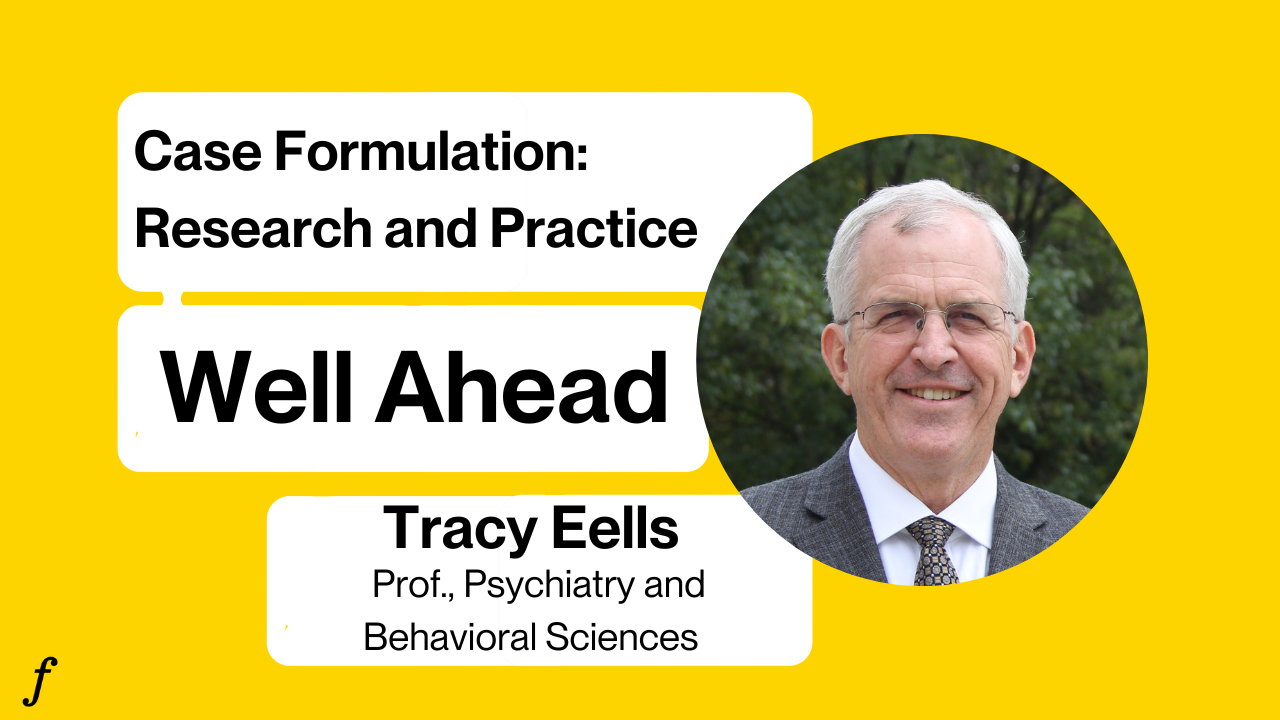Learn more about mental health, mental health technologies and case formulation from our highly skilled experts.
Watch the video trainings on case formulation and short videos about Formulator for free here.
The Crucial Role of Attachment in Psychotherapy: A Dive into Research, Measurement and Therapy Recommendations
Bowlby’s attachment theory has been a cornerstone of psychological research and clinical practice, providing valuable insights into human relationships, emotions, and development. In the field of psychotherapy, understanding attachment is paramount, as it can greatly influence the therapeutic process and outcomes. This article delves into the significance of attachment in psychotherapy and the various ways it matters.
In Therapy, The Conversation Does Not Progress - What to Do?
Imagine sitting across from a client, their gaze fixed on the floor, words hesitant, and conversations stuck in a loop. Maybe they’re avoiding eye contact, and it feels like the conversation is going nowhere. As therapists, we have all been there—those moments when it seems like there is a big elephant in the room and time stands still. Even if you have been a therapist for a long time, seeing these things hinder your client’s progress can be frustrating. So, how can you navigate around this elephant and create a path forward together?
Where Does Customer Experience Originate in Therapy and How Can It Be Improved?
Customer experience in therapy is an essential part of therapy services. It begins even before the first direct contact with the client and can significantly impact the success of therapy. In this blog post, we will examine various aspects of customer experience and how Formulator can help therapists improve it.
How do you know if your client is not benefiting from your therapy?
Therapy is a transformative process that requires dedication and effort, both from the client and the therapist. As a therapist, it is important to regularly assess whether your clients are benefiting from therapy and if you are providing the support they need. While each client is unique and their progress is subjective, there are some factors to consider when determining if your therapy may not be suitable for a particular client. Recognizing these signs can help you make adjustments and provide the best possible care. Here are some indicators to watch out for.
Creating Safe Spaces: Encouraging Clients to Open Up About Taboo Topics with AI
In your role as a therapist or in your everyday interactions, you may encounter individuals who find it challenging to express themselves openly, especially when it comes to taboo topics. You might have heard some of the common phrases that people use to express themselves, such as:
"I don't know."
" I'm fine."
"I don't know how to explain."
The Importance of the Psychological Case Conceptualization in Therapy Practice
At Formulator, we understand the value of case formulation in therapy practice. That's why we've digitalized the process to help therapists provide effective and successful therapy for their clients. In this podcast episode, we interviewed Tracy Eells, a renowned clinician and researcher on the topic of case formulation, to provide insights on its importance.
Differences between short and long therapy process - What is happening in there?
A skilled therapist knows how to target their work in both short and long therapies. They invest in understanding the customer's situation, setting clear goals and frameworks and actively utilize multiple therapy methods. During long therapies, there is time to deepen and utilize the therapeutic relationship between the client and the professionals, while short therapy requires a different kind of focus to achieve results.
Set up for success: Setting Realistic Goals for Effective Therapy
When embarking on a therapeutic journey, both the therapist and the patient hold expectations about both the process and its outcomes. For both brief and long therapeutic interventions there is usually a set limit for the amount of sessions. A good therapist can do wonders, but still most probably not cure everything. Thus it is essential to establish realistic and clear expectations to ensure that the treatment aligns with the patient's current needs.
What Can AI Offer to the Field of Mental Health - The Complete Interview with Giulio Jacucci
The second episode of Well Ahead is about the possibilities and challenges that arise when developing artificial intelligence systems inside the mental health care. Giulio Jaccucci is a professor in Computer Science at the university of Helsinki, focusing on human-computer interaction. Topics such as Giulio Jaccucci's thoughts on OpenAI's Chat GBT, how our AI-assisted conversational agent was made, and what theoretical background the AI runs on as well as current and future solutions to digital tools within the mental health field will be discussed! Listen to the podcast episode here or read it from below.
The Art and Science of Being a Therapist: Insights from Tracy Eells
Eells compares learning case formulation to learning to play a musical instrument, stating that "it depends on the person, of the starting point of the person, trying to learn a tune." Initially, it may take some time to formulate a case, but over time, therapists develop a "case formulation lens" through which they can understand their clients and why they are doing therapy with them.
Evidence-Based Case Formulation in Psychotherapy
An Interview with Tracy Eells
At Formulator, we have digitalized the psychological case formulation process. Our psychologist, Sini-Sofia Savola, had the pleasure of interviewing Tracy Eells, the most famous clinician and researcher on the topic. In this blog post, we'll explore evidence-based case formulation and how established models and theories can guide psychotherapists in understanding a patient's psychological and emotional state.
The practice and research on case formulation - The complete interview with Tracy Eells
We at Formulator have digitalized the psychological case formulation so it is no secret that our psychologist Sini-Sofia Savola is overly happy to interview Tracy Eells on this podcast episode. Tracy most probably knows the process of case formulation better than anyone in the world. He is the most famous clinician and researcher on this topic. Listen to the podcast episode here or read it from below.
Genetics and Mental Health: Understanding the Role of Heredity in Psychological Wellbeing
It is widely accepted that genetics play a critical role in shaping our mental health and well-being. While different diagnoses may have distinct sets of symptoms, there is evidence that predispositions to mental health issues are often hereditary. In this post, we will explore the ways in which genetics affect our mental health and highlight some key findings from recent research.
Managing our emotional and ethical workload
As mental health practitioners we focus on helping clients improve their own situation. As this can only happen in a trusting and well-focused relationship, we need to make sure that we are in good form for this kind of interaction.
How to succeed at limited interventions
The reality faced by many mental health practitioners is that the time spent with the client is often limited. We may have 20 therapy sessions at our disposal but many of us are working with a limit of 3-5 for counseling sessions or even a single session that we try to make the most of. Here are some key success factors for making an impact within a limited time frame.
Should you know something about your client before the first session?
As mental health practitioners, we strive to create a safe and non-judgmental space for our clients. By building a therapeutic alliance with them, we help them understand their issues and help them navigate through their struggles. One of the most critical steps in this journey is the first session. It sets the tone for the rest of the therapeutic process, and it's essential to get it right.
Whitepaper: What can AI offer to the field of mental health?
AI can be very effective at solving complex problems on a large scale. Recent developments such as ChatGPT have showed that machine learning based language models and chat bots can quite reassuringly act as conversational agents and interact with users in discussions that uncannily mimic meaningfulness. Instead of feeling intimidated by this, we should look at the opportunities for integrating AI as a part of good interaction between health care providers and clients.
What is case formulation?
Have you ever wondered what a case formulation is? Or why it is such an integral part of the mental health professional - client relationship?
Our very own head of science Katri Kanninen, PhD and CAT psychotherapist trainer, explains what a case formulation is, how it is made, which elements it includes, and why it is such an important aspect in the everyday work environment for any mental health provider.
What are the challenges of digital mental health care solutions?
The demand for accessible, low threshold mental health care is on the rise and digital interventions are a good way of meeting this demand. With Covid 19 severely restricting traditional face-to-face appointments, digital solutions were forced to take a leap from nice-to-have add ons to providing efficient interventions and treatments. It is crucial that mental health services are scaling up to meet the increasing demand, but what kind of challenges are there in providing accessible and effective interventions?
The importance of psychological formulation in mental healthcare evaluation
For many of us clinicians, it is tempting but ill-advised to begin treatment once the score has been calculated. Why do we need psychology to flesh out the information provided by these scientifically valid and reliable tools?





















